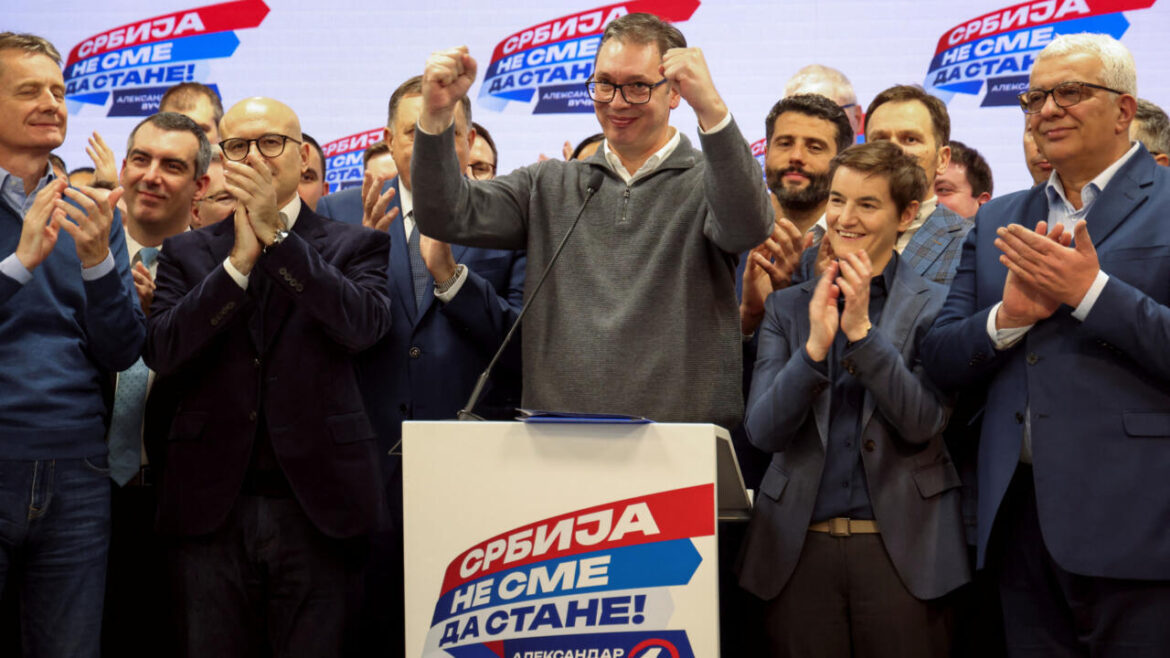Winner of the legislative elections on Sunday in Serbia, the nationalist president, Aleksandar Vucic, navigates halfway between the European Union, which Belgrade officially wants to join, and Russia, with which he maintains privileged relations.
Published on :
5 mins
There were no surprises this Sunday, December 17 in Belgrade. The Serbian legislative elections saw the nationalist and pro-European SNS (Serbian Progressive Party, engaged under the “Serbia Must Not Stop” list) triumph by winning 46.7% of the votes and 127 of the 150 seats in Parliament. According to these first official results, the party of President Aleksandar Vucic, re-elected in 2022, was well ahead of the opposition led by the “Serbia Against Violence” coalition list (23.5%). The SNS also came first in the race for mayor of Belgrade with 44.5% of the vote, still ahead of the coalition (38.2%).
The legislative and municipal elections were, however, marred by numerous irregularities, according to the Center for Research, Transparency and Accountability (CRTA), in a country still largely undermined by corruption. According to observers from this NGO created in 2016, “irregularities that directly compromised the election results were recorded in five percent of polling stations during the parliamentary elections and in nine percent of polling stations during the elections in Belgrade. ” The CRTA speaks in particular of “pre-filled ballots”, “organized migration of voters” or even “pressure and bribes”.
The allegations of fraud were confirmed by a preliminary report from the international observation mission (OSCE, European Parliament and Council of Europe), which mentioned “vote buying” and “ballot box stuffing”.
Monday evening, several thousand demonstrators gathered in front of the headquarters of the electoral commission (RIK) to demand a cancellation of the municipal elections in Belgrade, described as the most contested.
Corruption and political violence
The climate of political violence surrounding the elections in Serbia does not seem to be improving. “Unfortunately, this time again, we are faced with enormous fear in Serbia… We live in a country of violence, corruption and terrible crime,” declared one of the leaders of the “Serbia” coalition a few days ago. Against Violence”, Borko Stefanovic. On November 23, 2018, the opponent was beaten with an iron bar, on the sidelines of a political meeting in Krusevac, a bastion of central power.
These allegations go down badly in Brussels, ten years after the start of Serbia’s accession negotiations to the EU. A few weeks earlier, the Council of the EU issued a mixed report on the democratic situation in this small Balkan country (7 million inhabitants), stressing that it must “intensify its efforts in the fight against corruption and organized crime and fight against all forms of disinformation.
But does Serbia really want the European Union? This is the question that several observers are asking. According to Florent Marciacq, researcher associated with Ifri and specialist in the Balkans, “there are reforms which are only made in appearance and an autocracy which is being consolidated”. The specialist evokes “a decline in press freedom, political violence which is developing”. Above all, “the fight against corruption is only making progress in appearance. There are reforms implemented in hospitals, but not on major investment projects”, specifies the researcher.
Russia in ambush
Another issue that drags on in the eyes of Europeans: Kosovo. If since 2011, Brussels has been pleased to maintain dialogue between Serbia and this region with an Albanian majority, whose independence proclaimed in 2008 has still not been recognized by Belgrade, discussions on mutual recognition are struggling to succeed. Last March, Belgrade and Pristina once again failed to reach an agreement. “Vucic will continue to play a double game. He gives false guarantees to the EU on certain issues to show that he is of good will, but in reality his maintenance in power is linked to organized crime,” analyzes a political advisor from the region who prefers to remain anonymous.
Peace efforts definitively fell through on September 24, when a commando of several hundred heavily armed Serbs stormed the village of Banjska, killing four people. According to Le Monde, more than forty RPG anti-tank rocket launchers, nearly 200 grenade launchers, dozens of automatic rifles, mines and 80,000 rounds of ammunition were found in vehicles abandoned around the town. The Kosovars, who stopped the attack at the last minute, directly accused Belgrade of having orchestrated the attack, which Aleksandar Vucic denied. But the investigation quickly showed that he knew the leader of the commando, Milan Radoicic. The latter was even the vice-president of the Serbian List for Kosovo, a formation considered to be the political arm of Belgrade in northern Kosovo.
Read alsoHow the attack on a village in Kosovo reignited tensions with the Serbian enemy
“We found weapons caches in northern Kosovo to arm nearly 400 people. How did they get in? Someone will have to answer one day. European diplomats still want to believe that Belgrade is outside all this, which greatly frustrates Pristina,” warns the Balkans political advisor.
To put pressure on its neighbor Kosovar, Serbia can notably rely on its second ally, Russia. The two countries maintain deep historical and cultural ties, as well as a mutual distrust of NATO, which bombed Belgrade in 1999, during the war with Kosovo. According to a survey by the European Council on Foreign Relations conducted in 2022, 54% of Serbs consider Russia an ally and 95% a necessary partner. The Balkan country has never adopted Western sanctions against Moscow initiated after the invasion of Ukraine in February 2022. “Serbia is dependent on Russia on the international scene to promote its non-recognition agenda of Kosovo”, confirms Florent Marciacq. The Kremlin made no mistake. Sunday evening, after Aleksandar Vucic’s victory in the legislative elections, Dmitri Peskov, Vladimir Putin’s spokesperson, was quick to congratulate him.



